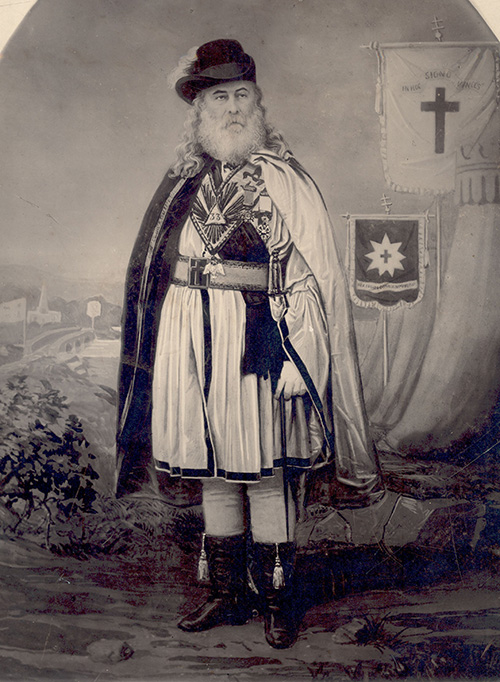PIKE, ALBERT (1809–1891).
Born in Boston, Massachusetts, on December 29, 1809, Albert Pike served as Confederate Indian commissioner and military commander of Indian Territory during the Civil War. His family moved to Newburyport, Massachusetts, in 1814, and he attended school there. Lacking the funds to attend Harvard, Pike taught school to save money to travel in the West. In 1831 he accompanied a trading party from Missouri to Santa Fe.
Pike reached Fort Smith, Arkansas Territory, on December 10, 1832. He taught school and wrote poetry and prose for the Little Rock Advocate and became the newspaper's editor in October 1833. After marrying Mary Ann Hamilton in 1834, Pike purchased the Advocate and became an attorney.
Prior to serving in the Mexican War, Pike practiced law before the U.S. Supreme Court. In 1852 he represented the Creek Nation of Indian Territory in a claim for ceded tribal land. His efforts attracted the attention of the Choctaw and Chickasaw, who hired him to pursue a similar case in 1854. Although Pike won the cases, insufficient reparations were awarded to the tribes in 1856 and 1857.
Pike returned to Little Rock in 1861. As the Civil War approached, he decided to serve the Confederacy. Appointed Confederate commissioner of Indian affairs in March 1861, Pike negotiated treaties of alliance between the Confederate government and the Creek, the Choctaw and Chickasaw, the Seminole, the Osage, and the Seneca and Shawnee. After much negotiating, Cherokee Chief John Ross signed a treaty on October 7, 1861. Seven days later Pike was appointed brigadier general of the Provisional Army of the Department of Indian Territory, with his headquarters at Fort Davis in the Cherokee Nation. After participating in the Battle of Pea Ridge, Arkansas, in March 1862, Pike withdrew his troops to Fort McCulloch in the Choctaw Nation.
In January 1862 Indian Territory had been placed within the Trans-Mississippi District. When District Commander Gen. Thomas C. Hindman ordered Pike to send troops to Arkansas in May 1862, Pike resigned in protest. He argued that his command should be separate from Hindman's and that his troops should not serve outside Indian Territory. Pike exacerbated the situation by publishing his views about Hindman's military shortcomings and by proclaiming his grievances against Hindman's predecessor, Gen. Earl Van Dorn, for taking provisions, equipment, and monies from Pike's command for use elsewhere.
Pike's conduct led to his arrest in November 1862, but charges against him were dropped. After the war he became reclusive and devoted his life to working for the Scottish Rite of Freemasonry in Washington, D.C., where he died on April 2, 1891.
See Also
Bibliography
Walter L. Brown, A Life of Albert Pike (Fayetteville: University of Arkansas Press, 1997).
Robert L. Duncan, Reluctant General: The Life and Times of Albert Pike (New York: E. P. Dutton, 1961).
Kenny A. Franks, "The Implementation of the Confederate Treaties with the Five Civilized Tribes," The Chronicles of Oklahoma 51 (Spring 1973).
Thomas W. Kremm and Diane Neal, "Crisis of Command: The Hindman/Pike Controversy Over the Defense of the Trans-Mississippi District," The Chronicles of Oklahoma 70 (Spring 1992).
Citation
The following (as per The Chicago Manual of Style, 17th edition) is the preferred citation for articles:
Ingrid P. Westmoreland, “Pike, Albert,” The Encyclopedia of Oklahoma History and Culture, https://www.okhistory.org/publications/enc/entry?entry=PI006.
Published January 15, 2010
© Oklahoma Historical Society


